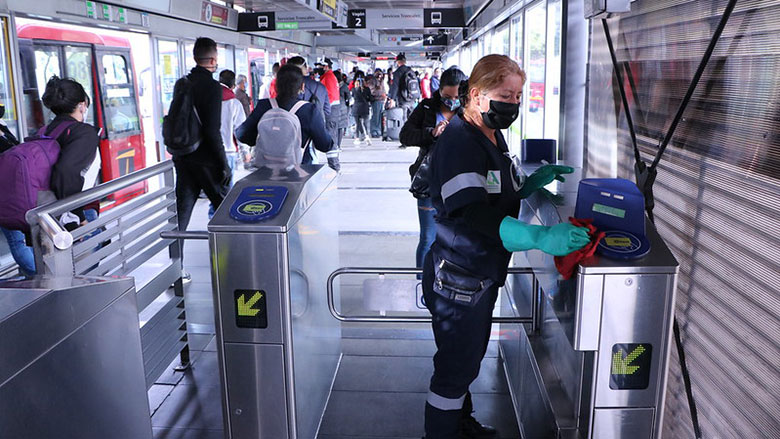Results
Since its approval in June 2020, the COVID-19 Crisis Response DPF has supported improvements in several key outcomes:
- Project support allowed the government to anticipate transfers of Col$2.1 trillion (Colombian pesos) to help guarantee the financial liquidity of the country’s hospitals and clinics, enabling them to respond to the health emergency. Of these resources, Col$782.5 billion was transferred from the Administradora de los Recursos del Sistema General de Seguridad Social en Salud (ADRES, the agency that administers health system resources) to guarantee the continuity of medical services for patients with rare and costly diseases while simultaneously responding to contingencies arising from the COVID-19 crisis.
- The government provided additional cash transfers to 2.6 million poor households, 296,000 young people, and 1.6 million poor elderly citizens. Moreover, the number of vulnerable households benefiting from social programs through Ingreso Solidario increased by 3 million.
- Around 5.6 million minors received nutritional support at home as part of the adapted school feeding program.
- The National Guarantee Fund extended a Partial Credit Guarantee of Col$4.9 trillion of private sector credit to protect the working capital of small and medium-sized enterprises (MSMEs). Another Col$2.4 trillion of private sector credit was extended to employers for salary payments, while an additional Col$3.9 trillion of private sector credit was extended to support the income of professional and independent workers.
- The government facilitated the extension of a new credit line worth Col$3.2 trillion through Bancoldex (Colombia’s development bank), Finagro (a fund supporting the agricultural sector), and Findeter (the Territorial Development Finance Bank), which helped greatly to support MSMEs’ working capital and salary payments.
- The government decreed a process to accelerate tax devolutions, under which 19,673 requests for tax devolutions worth Col$7.9 trillion were settled.
Bank Group Contribution
The World Bank, through the International Bank for Reconstruction and Development (IBRD), financed the US$700 million DPF loan to support Colombia’s effort to respond to the COVID-19 pandemic crisis.
Partners
Since the emergence of the COVID-19 crisis, the World Bank has further intensified its traditionally close dialogue and collaboration with development partners in Colombia. The loan was coordinated with parallel loan operations from the Inter-American Development Bank and CAF Development Bank of Latin America to support policy actions aligned with and complementary to those supported by this COVID-19 crisis DPF. Moreover, the World Bank team was in close dialogue with the French Agence Française de Développement (AFD) and the German Kreditgesellschaft für Wiederaufbau (KFW). In addition to financing, the World Bank is also working closely with all development partners, including the United Nations system, to provide analytical support to the Colombian government. One example is the ongoing collaboration on Pulso Empresarial, a survey of the private sector to gauge the impact of the COVID-19 crisis on firms.
Beneficiaries
Colombia’s population benefited from the project’s support for the health system and for limiting the economic shortfall. The operation has contributed to the temporary expansion of the social protection system through Ingreso Solidario, additional transfers for existing programs, and the adaptation of preschool and school feeding programs. The mitigation measures supported by the operation are estimated to have kept around 632,000 people out of poverty, narrowing the crisis-induced increase in the headcount poverty rate by around 1.3 percentage points. In addition, the operation has supported the firms’ maintenance of liquidity and access to finance. One of the beneficiaries of the Ingreso Solidario program, Heidy Barrera, said in an interview conducted by the government in April, "This money will allow me to buy food for my household."
Moving Forward
The program supported by the DPF has helped create a path toward an effective recovery as well as supporting a longer-term development agenda in some key areas. For example, preparation of the DPF was accompanied by the Bank’s elaboration of a control panel through which mayors and governors can make more effective decisions on sector reactivation by considering the safest sectors and those with the greatest impact on the economy. In addition, the DPF has supported a change toward a more adaptable social protection system, and it has strengthened the social registry to more effectively identify the most vulnerable populations. With Bank assistance, progress has been made in the development of the SISBEN IV, a social policy instrument that registers individuals by socioeconomic condition, enabling targeted social spending using statistical and technical tools to identify and order population groups for the selection and allocation of subsidies and benefits from entities and programs.
In addition, the IBRD has provided a Program-for-Results project in the health sector (P169866) and the Infrastructure Resilience DPF (P173424). Support from the International Finance Corporation (IFC) to help manage the COVID-19 crisis includes credit lines to existing global IFC clients under streamlined approval processes and facilities for clients in the financial sector to access short-term financing through trade guarantees and risk-sharing facilities. The Multilateral Investment Guarantee Agency (MIGA), complementing the IFC Trade Finance response, designed a COVID-19 fast-track response package focused on procuring urgently needed COVID-19 medical supplies/services, credit enhancement, and capital optimization programs. MIGA also supported Bancoldex, Colombia’s development bank.
Learn More
Colombia recibirá US$700 millones del Banco Mundial para fortalecer su respuesta ante la emergencia por Covid-19
COVID-19 Crisis Response DPF
